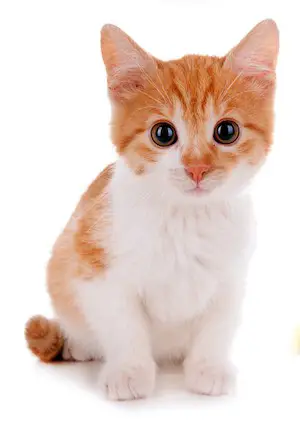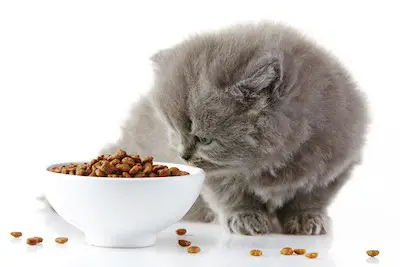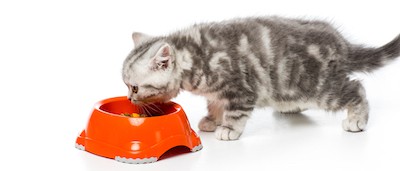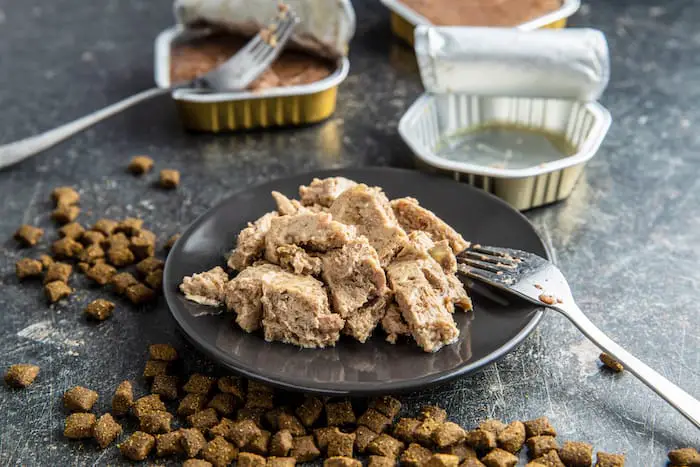Updated on
If you are the new parent of a kitten, you might we wondering what the best kitten food to buy is.
Your little kitten has been weaned off its mother's milk, and now she depends on you for proper nutrition. It is up to you to provide her with a balanced diet that will guarantee good growth and development.
To give you kitty everything she needs to live a happy and healthy life, you need to choose a food that has all those nutrients, vitamins, antioxidants, and other beneficial ingredients. But how to select the best food for your kitten? Let us help you.
Here's what's coming up:



Contents
- 1 Best food for kittens - TOP 3
- 2 What's the best kitten food for kittens? - Everything you need to know about feeding your kitten
- 3 What is the difference between kitten food and cat food?
- 4 How long should you feed kittens kitten food?
- 5 When should I switch from kitten to cat food?
- 6 Is wet or dry food better for kittens?
- 7 How many times a day should a kitten be fed?
- 8 What human foods can kittens eat?
- 9 Can a kitten eat regular cat food?
- 10 Can kittens eat tuna?
- 11 What kittens should not eat?
Or are you in a hurry?
You want to offer your kitten the best food you can, but you don't have the time to go into detail right now? Don't worry. These are the top kitten foods we recommend.
Best food for kittens -
TOP 3
Inexpensive, healthy, and vet recommended. Cats love the taste and texture. Real chicken will help you provide healthy proteins for your kitten, while grains and real vegetables add to a balanced diet.
- Vets recommend the food
- Real chicken is listed as the number one ingredient
- Antioxidants and vitamins A and E support the immune system
- Omega-6 fatty acids together with vitamins and minerals promote skin health and a glossy coat
- DHA supports brain and vision development
- No artificial flavors or fillers
- Crunchy texture and great taste
Why choose this product for your kitten:
Purina ONE Healthy Kitten Formula Kitten Food lists real chicken as their number one ingredient, which is to say that the food has a high protein content with high-quality chicken protein. It also contains healthy grains and vegetables to offer your kitten a well-balanced meal. There are no artificial fillers, and it contains all the essential vitamins and minerals like omega-6 fatty acids that ensure skin health and DHA, which supports brain development.
There is 46g of protein per cup to provide your kitten with the protein they need for muscle growth. Some of the protein comes from chicken by-products, which is not actually in any way harmful to your pet. After all, in the wild cats will eat the whole prey and not just the fillet.
The texture of the kibble is crunchy to promote dental health and to prevent plaque from building up. Many cats enjoy the crunch, and it gives them the variety they need in their food. The taste is also liked by most cats, which is important since your little kitty needs to eat a lot of food to keep her energy levels up.
Expert recommended high-protein and grain-free dry food for kittens. The optimal balance between all nutrients and a natural taste kittens love.
- Real chicken combined with chicken and fish meal
- High in proteins
- Grain-free
- DHA and ARA fatty acids
- LifeSource Bits with all the critical vitamins and minerals
- No wheat, corn, soy or artificial flavors or preservatives
- Suitable texture for kittens
- Tasty and full of natural flavors
Why choose this product for your kitten:
Blue Buffalo Wilderness Natural Kitten Dry Cat Food lists deboned chicken and chicken meal as their first ingredients, which means that the product is high in protein. The protein comes from high-quality sources, and there is fish meal included as well to offer a source of omega-3 fatty acids. The food contains 30% protein which is the optimal ratio for kittens.
Peas, potatoes, and sweet potatoes are added for healthy complex carbohydrates, and carrots, blueberries and cranberries for vitamins and antioxidants. The food also contains DHA and ARA fatty acids for brain development and taurine for eye and heart development. In addition, omega-3 fatty acids promote skin health and a shiny coat.
This food also includes kibbles which Blue Buffalo calls LifeSource Bits. They contain all the important minerals, vitamins, and antioxidants your kitten needs, and they are cold-formed to preserve all the effectiveness of these beneficial ingredients.
High in protein and grain-free with all the essential vitamins and nutrients. Different flavors help you provide your kitten with varied food, and the texture is smooth for even the youngest kittens to enjoy.
- Real poulty and fish as #1 ingredient
- High in protein to support growth
- Made with real milk
- Grain-free
- Four different flavors
- Smooth texture
Why choose this product for your kitten:
Purina Fancy Feast Grain-Free Pate Wet Kitten Food has real poultry and fish as the number one ingredient, which tells us that your kitten will be getting high-quality proteins. The food is grain-free and high in protein to meet the needs of your growing kitten.
There are four different flavors in the package, which allows you to give your kitten a varied menu. This will help her stay flexible with her food and not become fixed on a particular flavor.
Wet food is easy for your kitten to consume, and the food is 100% complete and balanced nutrition on its own. The texture is soft, so this food is suitable for even the smallest kittens that are being weaned from their mother's milk.
What's the best kitten food for kittens? -
Everything you need to know about feeding your kitten
So what should you look into when you're choosing the best kitten food for your kitten? These are critical factors:
1. Ingredients and nutrients
The best kitten foods are nutritionally balanced, and they offer your pet everything they need in their diet. When choosing food for your kitten, make sure it contains the right nutrients in the right proportions. Well-known high-quality products targeted for kittens often provide everything your cat needs, but there are differences.
These are some of the most important things to consider:
- Kitten food should be high in calories, protein, and fat to ensure healthy growth during the first year
- It should contain fatty acid DHA which is vital for brain and vision development
- The food should contain important minerals like vitamin E and selenium.
- It should also include highly beneficial antioxidants to support the developing immune system
- Calcium and phosphorus should be included for bone growth
- No artificial colors, flavors or preservatives


2. AAFCO endorsement
When looking fo the best food to feed your kitten, you should check the label. It should have one of the following mentions:
- "Meets the nutritional requirements of kittens established by the American Association of Feed Control Officials (AAFCO)."
- "Complete and balanced nutrition for kittens based on AAFCO feeding trials."
AAFCO is a group of state and federal officials who regulate pet food. With this written on the label, you can rest assured your kitten is getting its nutritional needs met.
3. Flavor and texture
When choosing dry kibble, you should make sure the texture is right for kittens. They have small mouths and teeth, which is why large pieces will be harder to consume. Small kibble will allow your cat to eat as much as she needs to meet her need for energy.
When you have a small kitten, it is advisable to provide them with food that varies in flavor and texture. By making small changes in their food early in their life, they won't become fixed on certain food and become a picky eater.
The best thing you can do is to pick a food that if available in different flavors. Once your cat gets used to one flavor, you can try another one. You can also feed them both wet and dry food to give them different textures. To prevent them from only favoring on type over the other, offer them at different times. You should give your kitten wet food twice a day and dry food for the other two feedings.


4. Calorie density
Kitten food should be high in calories because kittens need a lot of energy for growing. They also have higher activity levels than mature cats, which increases their calorie intake.
Choose a kitten food with a high calorie density to make sure your pet gets all the energy they need for growing and playing.
5. High-quality ingredients
Because it's your responsibility to offer your little feline friend with a proper diet, you should make sure the food only contains high-quality ingredients that support overall health.
Although you may be looking for affordable kitten food, you should not rely on the cheapest products to provide your kitten with what they need. Some of the more affordable food can be good too but do your research before choosing one.
The first months of your pets life are the most important because that is when all the development happens. To ensure a healthy rest of the life for her, feed your kitten with only the best ingredients at the beginning of her life.
Keep these aspects in mind when you choose the right food for your new feline companion. You should pick a few different foods to start with.
Cats are known as picky eaters, and it is always a good idea to offer them a diet that varies in texture and flavor when they are young. Your pet may easily get fixed on certain foods if you don't mix up their diet a bit. Offer them many kinds of food while they are still young and adaptable, but remember to make the transition gradually to avoid an upset stomach.
Provide both dry food and wet food with different flavors for the best mix.
These were the things to consider when choosing the right food for your kitten, but you may still have a few questions. How much food should you give your kitten or when is the right time to change to adult food?
Keep reading to learn more about feeding your kitten.
How long should you feed kittens
kitten food?
Kittens should be fed with kitten food until the age of 1. That is how long they have different dietary needs, and they need high-calorie food for growth.
Generally, cats are considered kittens until the age of one, and therefore you should feed them kitten food until that age. Some larger cats breeds are an exception to this rule since they take longer to reach adult maturity. These cats are not considered mature until the age of 18-24 months.
When should I switch from kitten to cat food?
You should switch to cat food at the age of 9-12 months. Make the transition slowly to avoid stomach upset or your cat being put off by the new food.
It's better not to mix the foods, since your cat may stop eating altogether if they find the new food off-putting. Instead, offer both foods in separate bowls slowly decreasing the amount of the old food. This will get your kitten to taste the new food and slowly get used to the texture and flavor.
Is wet or dry food better for kittens?
Kittens have small mouths and teeth, and therefore they can't chew well. It is important that small kittens are offered canned food as a part of their diet to ensure they get the proper nutrients and enough calories.
If you're feeding your cat with canned food only, it should be offered four times a day. And if you're mixing dry and wet food, you should be giving half and half. Offer canned wet food twice a day and dry food for the two other feedings.


How many times a day should a kitten be fed?
You should feed your kitten four times a day, but when your cat grows into an adult, it will only need food twice a day.
Since kittens are growing and active when they are small, there is usually no reason why you couldn't keep food available throughout the day. This will allow kittens that are growing slowly or that are underweight to get those calories they need. It can also help with stomach distention that may result from rapid eating.
If you decide to "free feed," you can do this until your kitten is four to six months old. At that age, it's better to transition into meals given 3-4 times a day.
However, if your kitty is overweight, you should only offer measured proportions at mealtimes. Check the package for appropriate portions and don't let your kitten snack. You should always try to prevent obesity instead of addressing the problem once your cat is already overweight.
Can a kitten eat regular cat food?
Feeding adult cat food to your kitten by accident will do no harm. However, feeding your kitten a regular diet of cat food that is designed for adult cats is not a good idea. Kitten food is specially designed to offer all those nutrients, vitamins, and calories kittens need for healthy growth.
By choosing to offer you kitten food that is designed to meet their nutritional needs, you will be ensuring a proper and healthy diet.
Can kittens eat tuna?
Many kittens may love tuna, and it will not harm them when fed occasionally and in small proportions. Your cat's main protein sources should still be other meats like chicken and beef because cats' digestive systems have not evolved to deal with large quantities of fish.
Feeding too much tuna may cause malnutrition and even mercury poisoning.
If you want to treat your kitten with tuna, you should only offer it in small amounts and only once or twice a week. If you're going to offer them canned tuna that has been designed for people to eat, choose tuna in Springwater. Tuna in oil or brine will contain too much oil and salt.
What kittens should not eat?
If you are not totally sure on what your kitten should eat and you haven't consulted a professional nutritionist, it's advised you feed you kitten with commercially packaged kitten food to ensure they get all the proper nutrients and vitamins they need. It will also guarantee you are not giving her any foods that are not suitable for your cat's digestive system and not putting your pet at risk.
You can give your kitten treats, as long as they make up less than 10% of the total calorie intake. Feeding your kitty with too many snacks will lead to them not eating their food – which will lead to an insufficient diet.
These are some of the foods you should not feed your kitten:
- Raw eggs may contain salmonella
- Raw meat or liver may contain parasites and harmful bacteria
- Raw fish may contain parasites and lead to vitamin B deficiency
- Milk may cause diarrhea
Other foods you should avoid because they can be toxic to kittens are:
- Onions
- Garlic
- Chocolate
- Coffee
- Tea
- Raisins
- Grapes


